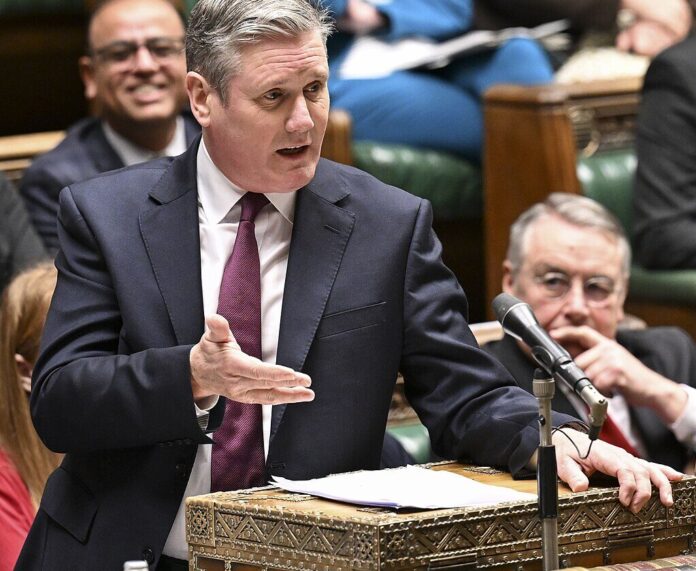Starmer’s authority shaken as welfare U-turn sparks fury, resignation talk, and cabinet unrest
Sir Keir Starmer‘s once-imperious grip on the Labour Party suffered a public and humiliating shattering on Tuesday as his welfare reform plans imploded in a dramatic Commons collapse that evoked memories of the worst days of Brexit-era parliamentary chaos.
Despite holding a commanding majority and a clear personal mandate, the Labour leader looked more like a prime minister adrift. Faced with a growing revolt over changes to Personal Independence Payment (PIP), Starmer and his top team misjudged the moment—twice—and paid the price in real time on the floor of the House.
The warning signs had been there. The first U-turn, announced in the dark hours of last Friday morning, was hastily cobbled together to quieten growing unrest among Labour backbenchers. But it fell short.
By Monday, a core group of around 50 MPs remained resolutely unconvinced. When ministers presented further details that evening, intended to reassure, they only fuelled more confusion and fresh anger.
Come Tuesday, the rebellion had swelled. Deputy PM Angela Rayner frantically worked the phones while party whips scanned spreadsheets with growing dread. When whispers reached No 10 that as many as 80 MPs might defy the whip, panic set in. Another humiliating U-turn was greenlit.
It fell to pensions minister Sir Stephen Timms to announce yet another retreat. But instead of unifying the party, the climbdown deepened the fractures. Loyalists felt duped for backing three policy positions in a single week. Rebels were left livid that their principled stand had been met with chaos, not clarity.
“Meg better own any autumn tax rises,” one angry MP snapped about Dame Meg Hillier, who helped broker the first climbdown. “She marched them all up the hill and couldn’t bring them down again.”
Others were even blunter. “Jokers,” said one backbencher of both government and rebels. “Nightmare,” added another.
In No 10, frustrations boiled over. Senior aides privately dismissed the class of 2024 MPs as entitled and naïve. “They all think they’re JFK because they delivered a few leaflets,” one source scoffed.
Now the political and fiscal fallout looms. Insiders believe the upheaval will all but kill any chance of lifting the two-child benefit cap in this autumn’s budget. Some openly question whether Chancellor Rachel Reeves can survive. Others are demanding Liz Kendall resign as Work and Pensions Secretary.
Worse still, senior advisers were rocked by Starmer’s recent anniversary interviews, which many interpreted as a public rebuke of his own inner circle. Morale is said to be dangerously low. “The atmosphere in there is appallingly bad,” one official said. “He’s dumping on people who got him where he is.”
To stem the bleeding, Starmer used Tuesday’s Cabinet meeting to defend his chief of staff Morgan McSweeney, insisting Labour wouldn’t have won without him. It was a rare moment of clarity amid the chaos.
Still, Starmer emerges from the welfare fiasco badly weakened. His authority dented, his unity shattered, and his reform agenda in tatters. He now must prove he can lead with conviction, not just caution.
Because if he doesn’t, Labour’s new majority could soon start to feel a lot like an old problem: a government not in control.
Embed from Getty ImagesTHE GUARDIAN
Keir Starmer’s handling of Labour’s welfare reforms has exposed deep cracks in his leadership, warns Rafael Behr. Though the bill narrowly passed after last-minute concessions, 49 Labour MPs still rebelled, signalling distrust in Starmer’s judgment and political instincts. He only engaged meaningfully with MPs’ concerns once a defeat seemed imminent, souring relations within his party. The Prime Minister’s strategy—rooted in vagueness and message discipline—once neutralised Tory fears, but now fails to inspire. With Labour’s popularity waning and Reform UK surging, Starmer’s attempts to woo disillusioned Red Wall voters by sounding tough on immigration and Brexit are backfiring, alienating liberal-left voters. Polling shows greater electoral potential among Greens and Lib Dems than Tory or Reform voters. Behr argues Starmer must realign with the progressive base, focus on climate, the NHS, and foreign policy threats like Trump, and stop trying to outflank Farage on nationalism. If Starmer wants to define the next election as a battle for Britain’s soul, he must start acting like it.
BBC
Labour secured a 75-vote win on its welfare reform bill after last-minute concessions aimed at pacifying backbench rebels, but the victory was overshadowed by turmoil and mistrust. The bill, originally promising £5bn in savings through cuts to Personal Independence Payments (PIP) and universal credit, was dramatically weakened following fierce resistance. A final-hour U-turn postponed PIP changes until after a review, yet 49 Labour MPs still voted against it. Confusion gripped Parliament, with MPs criticising the chaotic process and poor communication. Work and Pensions Secretary Liz Kendall admitted there were “lessons to learn,” while many MPs remained sceptical about government promises. Critics argue the remaining reforms still risk pushing vulnerable people into poverty. Chancellor Rachel Reeves now faces pressure to plug a growing fiscal gap, fuelling speculation about future tax rises. With another vote set for 9 July, disillusionment among Labour backbenchers lingers, threatening Starmer’s authority and exposing a deeper disconnect within the party over its identity and direction.
